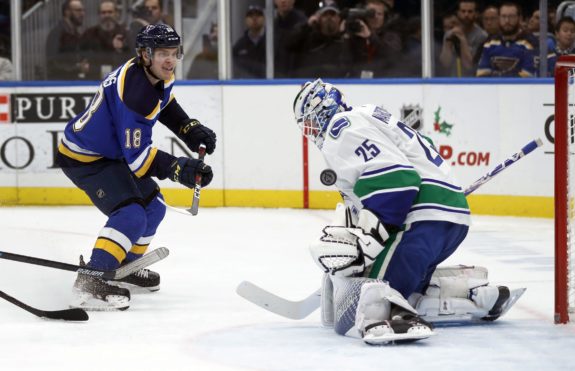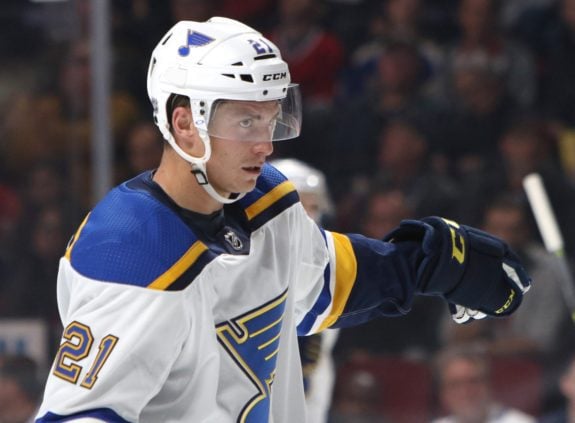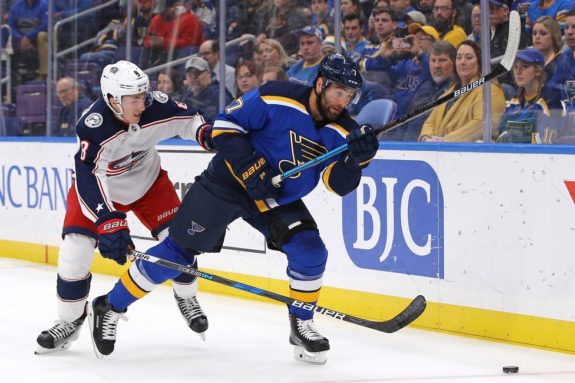The St. Louis Blues defeated the Dallas Stars 4-3 in Game 3 of their second-round series on Monday night, scoring the last of four goals in the third period to take the upper hand late and seal the victory. While there were many strong performers, one of the most overlooked players was Robert Thomas, the team’s unheralded rookie (behind goaltender and Calder Trophy finalist Jordan Binnington).
Throughout the playoffs, Thomas has justified every bit of hype as a top prospect, and has been an under-appreciated contributor to the Blues’ success. In Game 3 specifically, he proved once and for all that he deserves an expanded role and should get one if the Blues want their best forwards on the ice more.
St. Louis Blues’ Top Prospect
It may be surprising to discover that entering the season, Thomas was the rookie sensation everyone in St. Louis was talking about. A first-round draft pick in 2017, the Blues realized they had a special prospect as he assembled an increasingly impressive junior hockey resume.

During the season before his draft, Thomas helped lead the London Knights with 66 points in as many games, and an additional 12 points in 14 postseason contests. But he really shined in his post-draft season, when he collected 75 points in 49 games between the Knights and the Hamilton Bulldogs, to whom he was traded mid-season.
With the Bulldogs, Thomas soared, and when the team got to the postseason, he was a different player. He scored 32 points in 21 games and led his team to the Memorial Cup, winning the OHL Championship. He was also named the Most Valuable Player of those playoffs.
In addition, he reached the pinnacle of junior hockey by bringing home gold for Team Canada at the 2018 World Junior Championships, alongside fellow Blues prospect, Jordan Kyrou. With that performance, the pair entered the season as the Blues’ top two prospects, and, thanks to the age restrictions on Canadian Hockey League players, Thomas seemed likely to lock down a roster spot.
Thomas’ Stellar Postseason
Despite a mildly rocky start, Thomas assembled an impressive regular season, finishing with 33 points in 70 games. He also had a 51.3 percent Corsi For percentage, which measures a player’s possession of the puck while on the ice. That’s an impressive mark for a rookie, especially a 19-year-old.
Towards the end of the season, Thomas developed strong chemistry with linemates Tyler Bozak and Patrick Maroon. Bozak and Thomas’ speed and skill paired well with Maroon’s physicality, and they became an integral line for the Blues.
In the postseason, their significance has grown. While interim head coach Craig Berube has tinkered with other lines, he hasn’t touched Thomas’, and with good reason. They have been the most consistent grouping on the team.
Though he hasn’t put up the monstrous stat sheet numbers of his OHL playoff days, Thomas’ postseason numbers are eye-popping. He has just two assists, but is a plus-three. When he is on the ice, the Blues have created 31 high danger chances, while surrendering just 16. Most impressively, he has a CF% of 56.56 percent, a dominant number for a player so young.

Robert Thomas (AP Photo/Jeff Roberson) 
Tyler Bozak (Jean-Yves Ahern-USA TODAY Sports) 
Patrick Maroon (Billy Hurst-USA TODAY Sports)
In spite of all of that, Thomas has averaged just 13:15 per game in the postseason. It’s a number that does not match up with his performance, especially when players like Alex Steen (CF%: 37.95) are still averaging over 12 minutes per game.
Time for Berube to Change
To his credit, Berube has been fairly good at making changes on the fly in these playoffs. His decision to unite the line of Jaden Schwartz, Brayden Schenn, and Oskar Sundqvist late in Game 5 of round one arguably saved the series. But this is a trigger he has been too slow to pull.
Whatever the reason, be it more ice time for veterans, an over-dependence on players like Sundqvist and Schwartz, or outdated thinking about rookies in the playoffs, the Blues have been hesitant to feature Thomas in the role that he’s earned. But they need to do so immediately. His history and his recent performance indicate that if St. Louis gives Thomas more time, he’ll make the most of it.